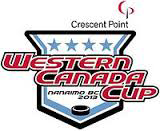Chris Lewgood isn’t surprised the Western Canada Cup has been discontinued, but he’s still lamenting the demise of the tournament.
Lewgood, the head coach and general manager of the Power Dodge Estevan Bruins, said he knew the 2017 edition of the tournament would be the last, even before the Bruins played host to the five-team showdown last year.
“In my opinion, it’s probably the best junior A tournament in the world,” said Lewgood. “I think, from a hockey standpoint, it’s sad to see it dismantled. But from a viability standpoint, I think the provincial-regional playdown makes more sense.”
Estevan hosted the fourth edition of the tournament in April and May of last year. The tournament posted a surplus of $120,000, and it was the first time the Western Canada Cup had made money.
“The thing that stands out about Estevan is the size of the community and the nature of the event we put on here,” said Lewgood. “Our community is small enough that it’s community oriented and community minded, and it’s hockey country, just like the other communities.”
The strength and the generosity of the corporate community helped make last year’s tournament a fiscal success, he said.
Lewgood suspects this year’s tournament in Penticton, B.C., also made money.
He’s not sure why the previous editions of the tournaments suffered financial losses. But he noted Fort McMurray, Alberta, hosted the tournament less than a year after the price of oil slumped.
“We were lucky to go fourth, learn from the first three, and improve on what they did,” said Lewgood.
The Western Canada Cup featured the league champions from the B.C., Alberta, Saskatchewan and Manitoba junior A leagues, as well as the host team. The top two teams advanced to the RBC Cup national tournament.
Prior to the WCC’s arrival in 2013, the champions of the Saskatchewan and Manitoba squared off for the Anavet Cup in a best-of-seven series, while the top teams in B.C. and Alberta met in the Doyle Cup final. The winners of those tournaments advanced to nationals.
The Anavet and Doyle Cups will return next year.
“To have the opportunity to have three or four more home games per team is very attractive,” said Lewgood. “Although the host of the Western Canada Cup pays for the bulk of the expenses, it’s still lost revenues and added expenses for the teams attending.”
Lewgood noted this year marked the first time that a participant from the Western Canada Cup didn’t win nationals. The Brooks Bandits won this year’s Western Canada Cup, but lost 3-2 in overtime to the RBC Cup host team from Cobourg, Ontario.
The Bruins have now set their sights on hosting the RBC Cup, and he believes it’s just a matter of time before they submit a bid.
“We know that with the success we had at the Western Canada Cup, and the obvious desire from our community to see those types of events, we will be looking towards hosting a national championship in the future,” said Lewgood. “Whether it’s the near future or the distant future, I’m not sure.”

